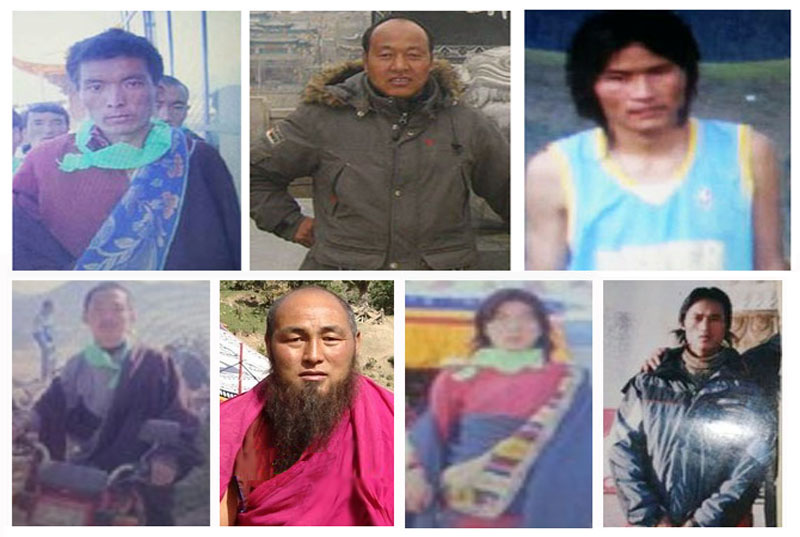 Dharamshala: — A Chinese court on Friday sentenced three Tibetans to jail terms of up to 15 years for their alleged involvement in the massive wave of self-immolation protests against Chinese oppression. In the latest crackdown, Chinese authorities believe that this way is the only way to stop the self-immolation protests that has touched at-least 107 incidents in Tibet.
Dharamshala: — A Chinese court on Friday sentenced three Tibetans to jail terms of up to 15 years for their alleged involvement in the massive wave of self-immolation protests against Chinese oppression. In the latest crackdown, Chinese authorities believe that this way is the only way to stop the self-immolation protests that has touched at-least 107 incidents in Tibet.
The court sentenced Lhamo Dorjee to 15 years in prison, his civil and political rights deprived for three years. Kalsang Sonam also had his rights removed but two years and a 11 year jail term, Tsezung Kyab to 10 years, his civil and political rights deprived for one year on charges of “intentional homicide,” according to Chinese state controlled media. Trinley, an exile Tibetan told The Tibet Post International (TPI) that the "three Tibetan men have been convicted of murder and given harsh sentences for inciting self-immolations."
Their trial, as per usual, took place behind closed doors and in secrecy. According to our sources inside Tibet, "the so called Intermediate People's Court hearing was held under heavy military surveillance. The three were charged over accusations of inciting Tsering Namgyal to self-immolate. Tsering a 31-year old who set himself on fire near the local Chinese government office in Luchu for the cause of Tibet on November 29, 2012.
The nine arrested Tibetans over accusations of inciting others to self-immolate in protest against China were identified as; Kalsang Samdup, Nyima, Tsezung Kyab, Lhamo Dhondup, Dorjee Dhondup, Kalsang Kyab, Kalsang Sonam, Kalsang Namdren, and Sonam Kyi. All above from Dzamtsa Lotso village in Luchu, Amdho province, eastern Tibet.
Chinese authorities have thus far been unsuccessful in efforts to halt the fiery protests, as they continue to blame His Holiness the Dalai Lama who is the spiritual leader of Tibetan people. Tibetans in areas where the most of self-immolation protests have occurred, suffer severe oppressive atmosphere that they said has been created by a government hardline campaign against their language, culture and religion..
On January 31, Tibetans had been sentenced to between three and 12 years in prison in Gansu province after a self-immolation. On the same day, a court in Sichuan sentenced onother Tibetan to death with a two-year-reprieve and his nephew to 10 years for “inciting eight people to self-immolate, three of whom died.” On February 7, Xinhua reported that Chinese authorities in Qinghai had since November detained 70 “criminal suspects” and formally arrested 12 of them. Among the 70 was a man named Phagpa, 27, was sentenced to 13 years in jail.
Xinhua report claimed that Phakpa traveled illegally in 2005 from Tibet to India, where he received training at “an institute specially created for the ‘Tibetan independence." After returning to Tibet, the report claimed, Phakpa taught English at an orphanage and “delivered agitative speeches at the funerals of self-immolators.”
"There is a great confusion, when the world talk about the decisions made by Chinese court officials, announcing the deprived of civil and political rights of Tibetans for certain years. There is no civil and political rights, because any types of political activities and peaceful protests are not allowed," said Nyima T.J, a Tibetan political analyst in exile..
"Hu Jintao's version of harmony has brought only deadly bloodshed in Tibet that pushed China in top list of the worst human rights abusers in the modern history. The whole world know, it cannot be helped without a real political reform and openness in China, but so called "harmony" is only possible if the violation of human rights will be stopped in Tibet," Nyima further added.
"Arbitrarily detaining people and forcing them to undergo political indoctrination is an abuse of Chinese and international laws. The sentences are unjustified and against international norms," Nyima said. "The Chinese government is playing with the lives of innocent Tibetans and, the world community, including governments cannot remain silent on the current tragic situation in Tibet."
"It is true that the communist regime brought some economic development, mainly infrastructure development, inside Tibet since the occupation but the question is who actually benefited from this development in Tibet? the Tibetan political analyst asked.
"The developed transport facilities have assisted the regime to extract resources from Tibet and facilitated in bringing in more Chinese immigrants into Tibet; newly constructed huge buildings accommodated the government and military officials," he added.
"Of course, there is an economic development in Tibet, it is not because of China, we can see this kind of development in every corner of the world," he stated.


![Tibet has a rich history as a sovereign nation until the 1950s when it was invaded by China. [Photo: File]](/images/stories/Pics-2024/March/Tibet-Nation-1940s.jpg#joomlaImage://local-images/stories/Pics-2024/March/Tibet-Nation-1940s.jpg?width=1489&height=878)















